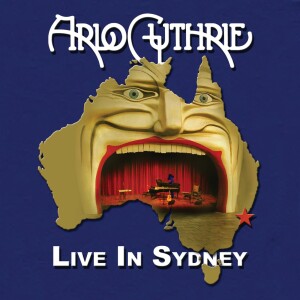 Nostalgia isn’t what it used to be. Who said that? Smart guy! [David: It was Peter De Vries, in his 1959 novel The Tents of Wickedness. – ed.]
Nostalgia isn’t what it used to be. Who said that? Smart guy! [David: It was Peter De Vries, in his 1959 novel The Tents of Wickedness. – ed.]
I remember when Arlo Guthrie was The Young Turk. His father’s son, he somehow bypassed any “new Dylan” tag, because he was Woody’s boy. His first big hit was a big one, a full side of a record, back when records were 12 inches across and black, with grooves on two sides and you could actually read the liner notes. Alice’s Restaurant was the album and the song. It was a kind of talking blues, with neat fingerpicked accompaniment and a long story about a lost Thanksgiving, some garbage and a trip to the draft board. Oh, and a real singable chorus. Cool.
Telling tales is one of the things Arlo does best, and this new double CD set features many of his stories. Whether talking about his dad, or Cisco Houston, or singing the same songs after 40 years. His voice is sounding older, but he’s still an engaging speaker, funny and charming. And his stories are darned interesting. When told that Bob Dylan was playing in Tucson the same night that Arlo was playing, the promoter asked, “If Bob Dylan’s playing here, why would anybody come and see you?” To which Arlo replied, “Well, anybody who wants to hear them old Bob Dylan songs, prob’ly need to come see me!” Then he plays Dylan’s “When the Ship Comes In.”
The album documents a concert in Sydney, Australia, in June 2004. Arlo sings and plays acoustic guitar and piano; his son Abe plays keyboards and sings backup; and Gordon Titcomb adds pedal steel and mandolin. The stringed instruments are beautifully recorded and really ring out. The vocals are strong and crisp. The first song, after a perfunctory “hello,” is “Chilling of the Evening,” long one of my favourites in its original rendition. It seems that Arlo does what Bob does; that is, rearrange the songs he’s been singing the longest to make them more interesting for himself.
He follows “Chilling” with one of his father’s songs, “Oklahoma Hills,” done in a western swing version, lots of steel and harmony, very nice. Stories follow, memories are shared, “St. James Infirmary” is sung. Then more tales, about Dylan, about songwriting, about Derroll Adams, about Alice, and between each yarn, another song. Arlo is a fine fingerpicker, and the two support musicians are dandy.
The first disc concludes with “Coming Into Los Angeles,” the second disc begins with “Green Green Rocky Road.” Not just an Arlo anthology then, but a troll through American folk music. “City of New Orleans” follows a memory of Steve Goodman; a story about Janis Joplin precedes a version of “Me & Bobby McGee,” and he starts to wind down with Woody’s classic “This Land Is Your Land.” He adds a long coda updating the audience as to the whereabouts of Alice, and closes with his own “Highway In the Wind.”
Nostalgia may not be what it used to be, but there’s plenty of it, and it fills both of these compact discs. The liner notes provide not only the lyrics, but every word of the stories too. Not that my old eyes can read them. It’s more fun to just lie back and listen anyway.
(Rising Son Records, 2005)
